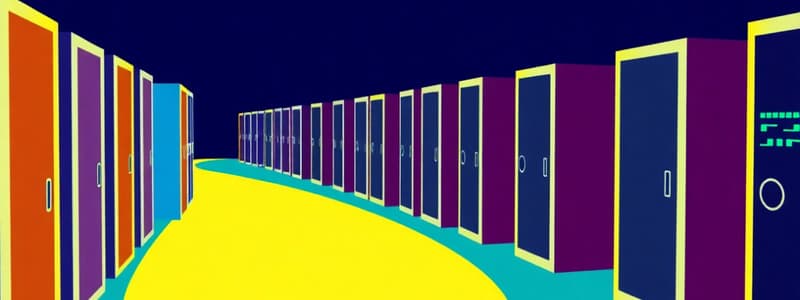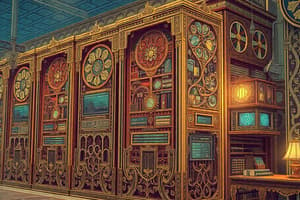Podcast
Questions and Answers
Which of the following are types of computers classified by size? (Select all that apply)
Which of the following are types of computers classified by size? (Select all that apply)
- Mainframe computers (correct)
- Supercomputers (correct)
- Personal computers (correct)
- Smartphones
- Minicomputers (correct)
What are supercomputers primarily used for?
What are supercomputers primarily used for?
Science, engineering, education, defence, aerospace
List three applications of supercomputers.
List three applications of supercomputers.
Weather forecasting, climate research, scientific simulation
Where are mainframe computers primarily used?
Where are mainframe computers primarily used?
A minicomputer is intermediate in size between a _____ and a microcomputer.
A minicomputer is intermediate in size between a _____ and a microcomputer.
The term 'minicomputer' is widely used today.
The term 'minicomputer' is widely used today.
Which of the following is a characteristic of personal computers?
Which of the following is a characteristic of personal computers?
What is a desktop computer?
What is a desktop computer?
What is the defining feature of a laptop computer?
What is the defining feature of a laptop computer?
What distinguishes a tablet from a laptop?
What distinguishes a tablet from a laptop?
Define a smartphone.
Define a smartphone.
Study Notes
Classification of Computers by Size
- Supercomputers: Extremely powerful machines capable of processing vast amounts of data quickly; used in fields such as science, engineering, and defense.
- Mainframe Computers: High-performance systems used for large data processing tasks, prevalent in institutions, healthcare, and financial sectors.
- Minicomputers: Mid-range computers that bridge the gap between mainframe and microcomputers; also referred to as small or midsize servers.
- Personal Computers (PCs): Small computing devices designed for individual use, including desktops, laptops, tablets, and smartphones.
Supercomputers
- Designed for substantial computational tasks, suitable for applications like weather forecasting and scientific simulations.
- Essential for industries relying on complex data analysis, such as climate research and oil exploration.
Mainframe Computers
- Serve large organizations, handling extensive information processing jobs across various sectors, including healthcare and finance.
- Used for tasks like census statistics, enterprise resource planning, and transaction processing.
Minicomputers
- Less common term now, often replaced by "small or midsize servers"; used primarily in small organizations.
- Offer intermediate capabilities between mainframe and personal computers.
Personal Computers
- Desktop Computers: Fixed location systems designed for use at desks, typically include monitor, keyboard, and tower.
- Laptop Computers: Portable systems that can be used on laps, featuring built-in screens and batteries for mobility.
- Tablets: Compact wireless touchscreen devices that are lighter than laptops.
- Smartphones: Mobile devices integrating computing capabilities, enabling many functions typical of personal computers.
Studying That Suits You
Use AI to generate personalized quizzes and flashcards to suit your learning preferences.
Description
This quiz explores the various types of computers classified by size, including supercomputers, mainframe computers, minicomputers, and personal computers. Understand the unique capabilities of each computer type and their applications in fields such as science, engineering, and education.




